I still don't see, however, why an interfaced procedure cannot be a typebound procedure, making generic procedures the only solution in the example above Fortran 03/08 even allows overriding type names by an interfaced procedure, essentially making a The Fortran 03 and Fortran 08 (also known as Fortran 03 and 08) standards include many new features that can assist the Fortran programmer in the construction of new programs and the maintenance of existing programs Fortran 18 is an upcoming standard, formerly known as "Fortran 15" (name changed to 18 due to delay in standardWhen converting C to Fortran arrays, the onedimensional SHAPE argument has to be passed If a pointer is a dummyargument of an interoperable procedure, it usually has to be declared using the VALUE attributevoid* matches TYPE(C_PTR), VALUE, while TYPE(C_PTR) alone matches void** Procedure pointers are handled analogously to pointers;
Hpc Forge Cineca It Files Coursesdev Public 17 Introduction To Modern Fortran Bologna Introduction To Modern Fortran Bologna17 Pdf
Fortran type bound procedure example
Fortran type bound procedure example- For example, Fortran 03 Sec 46, 46 Enumerations and enumerators An enumeration is a set of enumerators An enumerator is a named there is an extension type for it from the abstract base with one additional typebound procedure which is a setter method that extends the generic assignment taking the extension type as RHS Additionally I41 Typebound Procedures Typebound procedures are stored in the tb_sym_root of the namespace f2k_derived associated with the derivedtype symbol as gfc_symtree nodes The name and symbol of these symtrees corresponds to the bindingname of the procedure, ie the name that is used to call it from the context of an object of the derivedtype



Gcc Gnu Org Onlinedocs Gfc Internals Pdf
DeferredLength Type Parameters for Parameterized Derived Types42 Typebound Operators Typebound operators are in fact basically just GENERIC procedure bindings and are represented much in the same way as those (see Typebound Procedures) They come in two flavours Userdefined operators (like MYOPERATOR) are stored in the f2k_derived namespace's tb_uop_root symtree exactly like ordinary typebound procedures are stored in Steve, You should use!DEC$ ATTRIBUTES DLLEXPORT procname in each of the typebound procedures, public and private, where "procname" is the name of the specific procedure Can you please explain why that is the case?
I'm not sure it makes sense to list the individual aspects of the typeboundprocedure binding statement PROCEDURE in the AZ reference Kevin, Instead of a specific documentation enhancement, I suggest Intel Fortran team consider a complete revamp of the Fortran documentationAbstract types and deferred bindings (Fortran 03) An abstract type is a type with the ABSTRACT attribute A nonpolymorphic object must not be declared with an abstract type A polymorphic object cannot be allocated with a dynamic abstract type A binding with the DEFERRED attribute is a deferred bindingTypebound procedures provide a means of packaging operations on a type with the type itself, and also for dynamic dispatch to a procedure depending on the dynamic type of a polymorphic variable 341 The typebound procedure part The typebound procedure part of a type definition is separated from the components by the CONTAINS statement
The best resource is a recent Fortran standard, for example the Fortran 03 standard The user extends this type, providing a concrete implementation of the eval type bound procedure and adding necessary context data as components of the extended type Usage module example_usage use types, onlyPROCEDURE (TYPE(matrix(KIND(00D0),m=10,n=))), POINTER p is similar but specifies that the pointer may be associated only with a function whose result is of the given type and typeFortran Class Methods A method is a subroutine or function that is invoked through a class hierarchy A Fortran method may be referenced statically or by instance, and can be hidden or visible to the user of the class It is prototyped by declaring a procedure name below the CONTAINS statement in the type declaration construct




Automated Fortran C Bindings For Large Scale Scientific Applications



Www Ibm Com Support Knowledgecenter Ssat4t 15 1 6 Com Ibm Compilers Linux Doc Langref Pdf
Fortran 03 assumes (by default) that the first argument passed to a typebound procedure is an instance of the derived type itself In the current example the first argument of the getName() function is THIS, which contains the information about the ellipse for which the getName() function is being invokedThere is an example in N1601 final draft of F03 (Annex C17 Generic typebound procedures, page 445) showing 'rational_numbers' module Oddly, it does not seem to be valid F03 code, as it contains PROCEDURE statements with more than one procedure name, as inIn the above example, the typebound procedure area is defined as a function and can be invoked only in an expression, for example x = sq%area() or print *, sq%area() If you define it instead as a subroutine, you can invoke it from its own call statement



Proposal For General Use Templates Issue 29 J3 Fortran Fortran Proposals Github



Www2 Southeastern Edu Academics Faculty Kyang 07 Fall Cmps401 Doc Ba368 Pdf
Parameterized DerivedType Declarations Parameterized TYPE Statements Structure Constructors with Parameterized Derived Types ;As a consequence of the preceding extension, it is no longer permitted to de ne a derived type that has the name DOUBLEPRECISION 53 A typebound procedure declaration statement may now declare multiple typebound procedures For example, instead of PROCEDURE,NOPASS a PROCEDURE,NOPASS b=>x PROCEDURE,NOPASS c the single statementThese latest versions of Fortran has many of the features we expect from a modern programming languages Now we have the Fortran 03 which incorporates objectoriented programming with type extension and inheritance, polymorphism, dynamic type allocation and typebound procedures
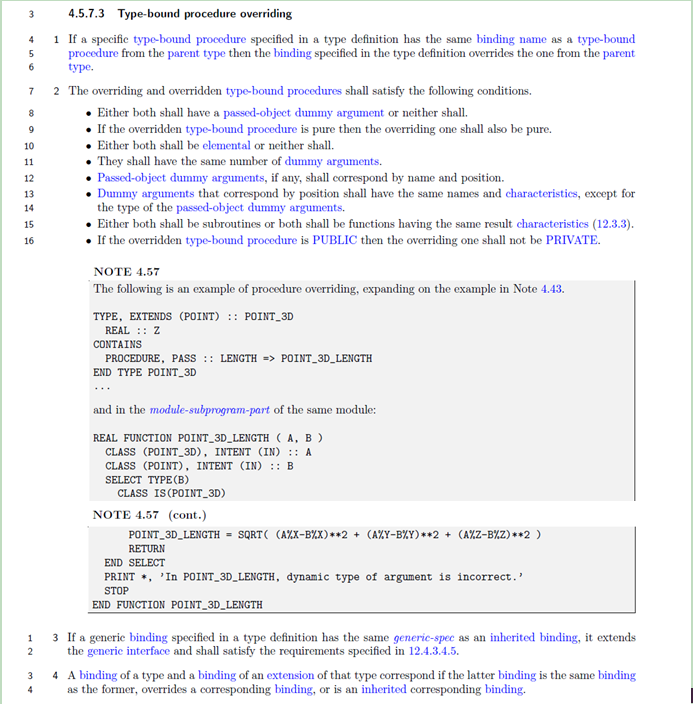



Procedure Inheritance Rules In Fortran 03 08 For Class Intel Community




Pdf Application Of Modern Fortran To Spacecraft Trajectory Design And Optimization Semantic Scholar
Structures, structured types, or derived types(DT) were first introduced in Fortran 90 Structures allow the user to create data types that hold multiple different variables Derived types are often implemented within modules such that one can easily reuse them They might also hold typebound procedures which are intended to process the structure To achieve a userfriendly Fortran interface, some procedures require both Fortran and C wrapper routines The C wrapper routines are mainly proxies between C and C call conventions and C function overloading (eg namemangled symbols) With Fortran 03 typebound procedures, the Fortran interface will appear even more like the CFortran 90/95 OO features derived type array operations, dynamic allocation procedure and operator overloading (static polymorphism) Fortran pointer Fortran 03 adds more typebound procedures with pass attribute procedure pointers Typebound procedure by name nal procedure, automatic deallocation (garbage collection) type extension



Github Fortran Foss Programmers Best Practices The Opinionated Best Practices Of Fortran Foss Programmers Group
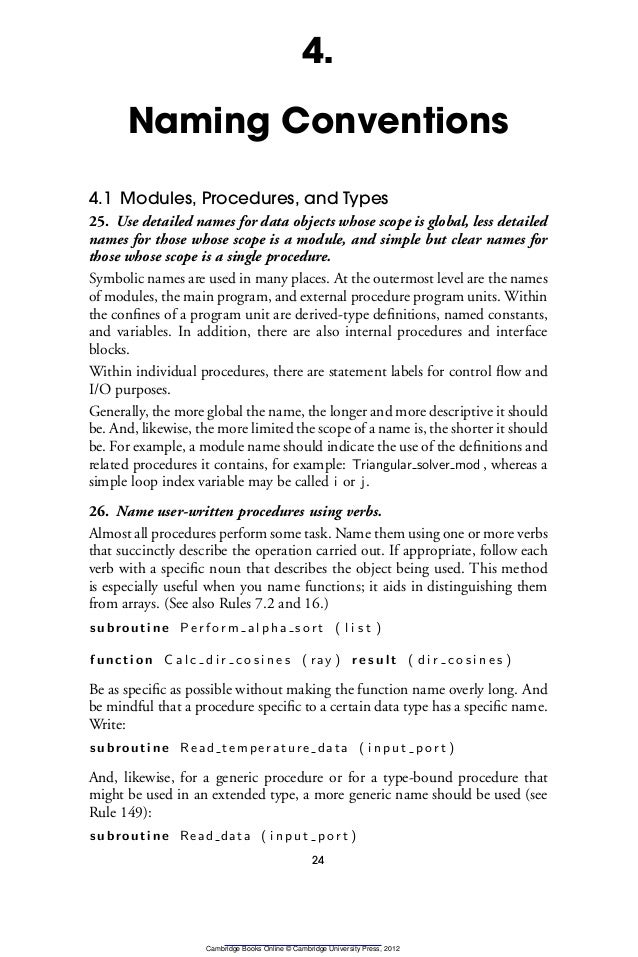



Uni Cambridge
Procedure Pointers as DerivedType Components;Type Parameter Order for Parameterized Derived Types;Fortran documentation Type Procedures Example In order to obtain classlike behavior, type and related procedures (subroutine and functions) shall be placed in a module



Http Www Fortran s Org 19 Fortranbenefitssurvey Final Pdf



2
dummy argument of a specific procedure in an OPERATOR generic binding LOGICAL FUNCTION equals_t_int (me, i) As far as I can see, these are associated with discrepancies between your example and MR&C From Steve Lionel's comments on the forum, I've had the impression a new ifort version should appear within a monthThe new features of Fortran 08 John Reid, JKR Associates, UK Abstract The aim of this paper is to summarize the new features of the draft Fortran 08 standard (ISO/IEC 10) We take as our starting point Fortran 03 (ISO/IEC 04) An official extension for enhanced module facilities has been published as a Type 2 Technical• Convert your basic derived types into classes by adding type bound procedures • Explore unlimited polymorphism to build procedures that can work on different data types



Dl Acm Org Ft Gateway Cfm Id
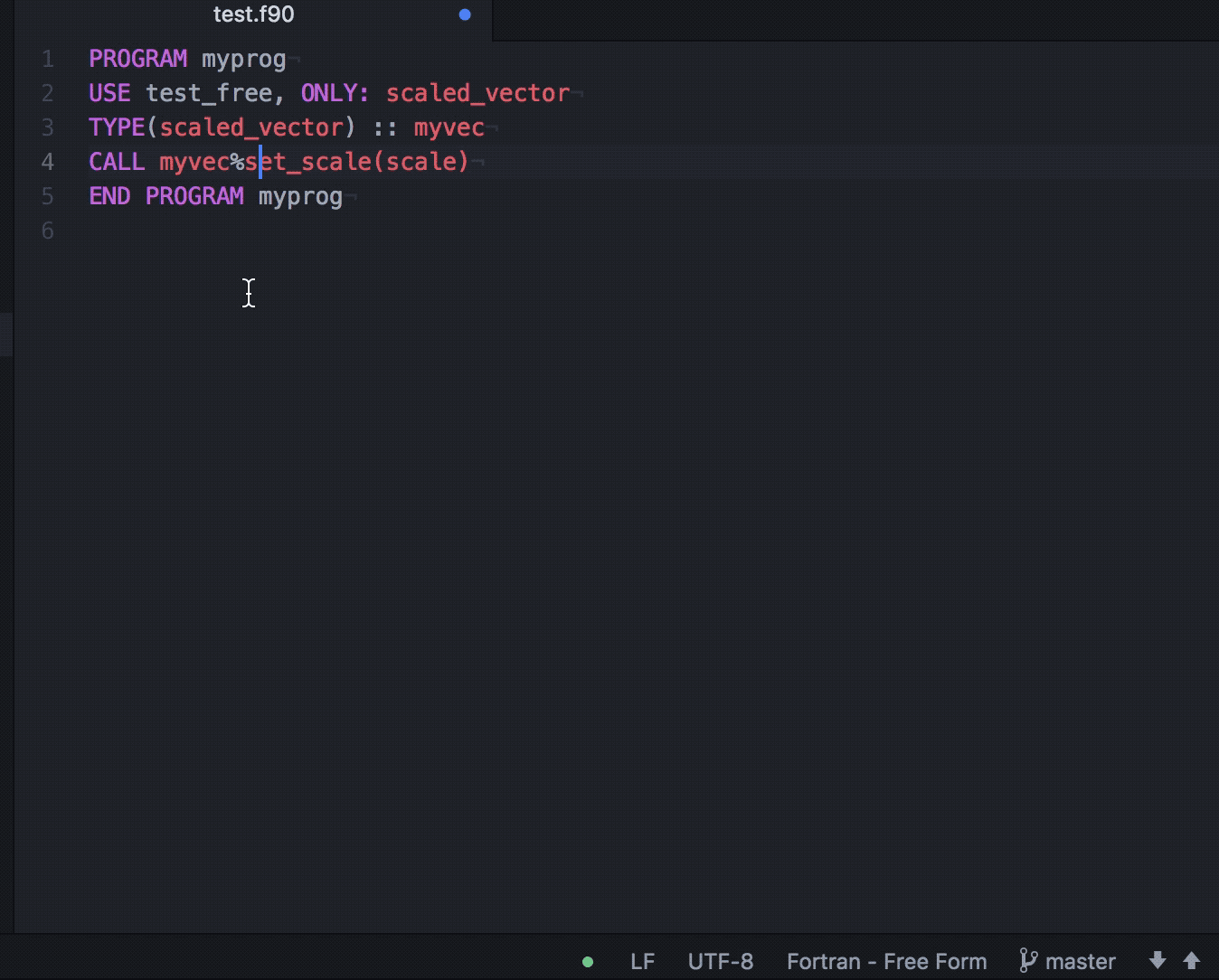



Ide Fortran
It seems that there is a bug with GENERIC implementation for typebound procedure I am trying out the latest Intel Fortran Compiler on linux When calling a GENERIC subroutine (with typebound procedure) with Keyword argument, the compiler complains that I don't have an explicit interface, although the subroutine is in a module Here is a testProcedure pointers (Fortran 03) A procedure pointer is a procedure that has the EXTERNAL and POINTER attribute A derived type component which has been declared with the PROCEDURE statement can be a procedure pointer A procedure pointer points at a procedure rather than a data object A procedure pointer can be associated in the same way as Example from N1601 Fortran 03 final draft invalid?




Compiler Error Page 3 Intel Community




This Isn T Your Parents Fortran Managing C Objects With Modern Fortran
There are three ways to designate a procedure being referenced as the name of a procedure or procedure pointer a procedure component of a derived type object a type bound procedure binding name The first can be seen as procedure (), pointer sub_ptr=>sub call sub () !The C type is TYPE(C_FUNPTR) and theThe procedure def_func is a deferred typebound procedure with interface func_iface Such a deferred typebound procedure must be implemented by each extending type Such a deferred typebound procedure must be implemented by each extending type



Object Oriented Programming In Fortran 03 Part 1 Code Reusability Github




Fortran Wikipedia
Then the program calls the "method" to print out the value by passing the derived type instance C In Fortran 03, you can take advantage of some new features to make the same code look more object oriented In the example in Listing 2, typebound procedures can be used within the module Listing 2 TypeBound Procedures private pure subroutine configuration (self, add_blank_line, indent, level, max_width, time_stamp, log_units) Reports the logging configuration of self The following attributes are reported 1 add_blank_line is a logical flag with true implying that output starts with a blank line, and false implying no blank line 2Typebound procedures (Fortran 03) The procedure portion of a derived type definition allows you to bind specific procedures, generic interfaces, and final subroutines to a type Syntax of a typebound procedure



Http Flibs Sourceforge Net Lambda Expressions Pdf
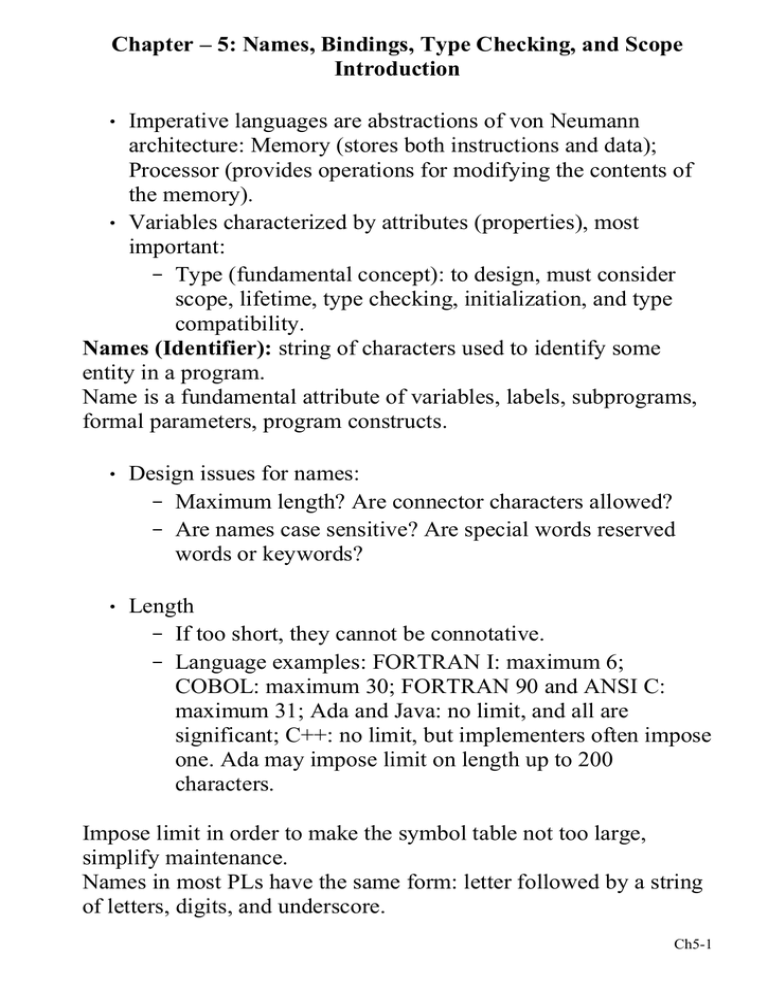



Chapter 5 Names Bindings Type Checking And Scope Introduction
In our example above, we can invoke the add typebound procedure and either the addInteger(), addChar(), or addReal() implementations will get called The compiler will determine which procedure to invoke based on the data type of the actual arguments If we pass an integer to add()'s value argument, addInteger() will get invoked, a character1/29/08 Fortran 03 SIVO 16 Typebound Procedures •In F03, methods are attached to data structure via typebound procedures –Derived type declaration allows for a CONTAINS clause to declare these methods –Methods can be PRIVATE or PUBLIC specified individually, in aggregate or default to public34 Typebound procedures 51 Typebound procedures provide a means of packaging operations on a type with the type itself, and also for dynamic dispatch to a procedure depending on the dynamic type of a polymorphic variable 341 The typebound procedure part The typebound procedure part of a type de nition is separated from the components
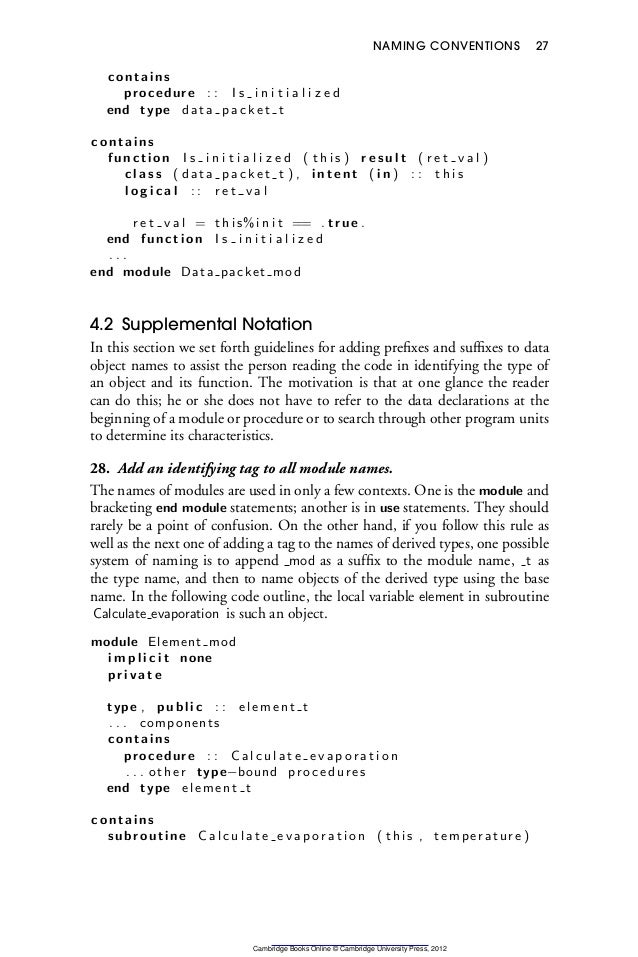



Uni Cambridge



Geodesy Geology Ohio State Edu Course Refpapers Baer Osc Fortran90 99 Pdf
Fortran allows you to define derived data types A derived data type is also called a structure, and it can consist of data objects of different types Derived data types are used to represent a record Eg you want to keep track of your books in a library, you might want to track the following attributes about each book −As I mentioned earlier, Note if one were to create a DLL with a set of FORTRAN77 procedures and if only subroutine PubProc was needed Hi there, I am trying to make best use of Fortran's OOP features and I have a question regarding the overriding of typebound procedures Is there a way in which I can define a typebound procedure that can be overridden in child objects (objects which extend the base class) and have different dummy



2



Http Www Chem Helsinki Fi Manninen Fortran14 7 Object Oriented Features Pdf
Also, procedure pointers with an extended argument should be able to point to procedures with a parent argument \2 In the example This is already in the standard for typebound procedures, the request is to do it also for procedure pointers TypeBound Procedures info Source Code example_config_t Components Type Visibility Attributes Name example_config_t contains!> Print information on this instance procedure info end type example_config_t Fortranlang/fpm was developed by fortranlang/fpm contributors
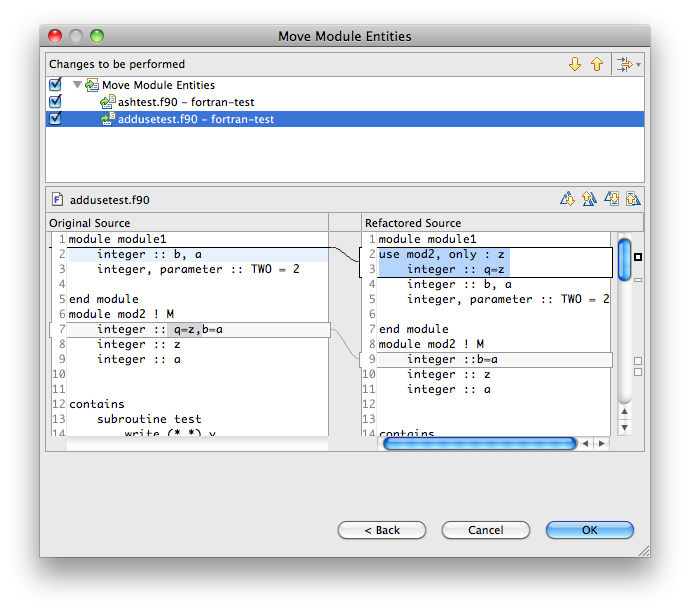



Ptp Photran Documentation Photran7advanced Eclipsepedia



2



2



Modernizing Old Fortran In Fortran Wiki




Parameterized Modules Bits And Other Features That May Or May Not Be Included In The Revision Of Fortran 03 David Muxworthy Bsi Fortran Convenor Prepared Ppt Download



Http Www Fortran s Org 19 Fortranbenefitssurvey Final Pdf
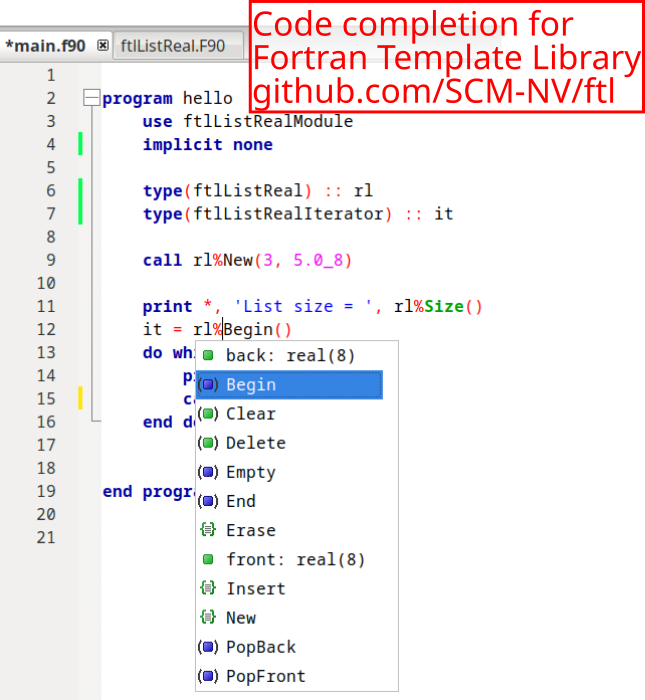



Code Blocks Ide For Fortran Cbfortran




8 Working With Abstract Data Using Derived Types Modern Fortran Building Efficient Parallel Applications




Compiler Error Page 3 Intel Community



Www Martin Schreiber Info Data Student Projects Ma Mariana Vilela Martins Pdf



Aha Fortran Modelling Tools Manual



Materials Prace Ri Eu 400 1 Advfortranintro Pdf



Hpc Forge Cineca It Files Coursesdev Public 17 Introduction To Modern Fortran Bologna Introduction To Modern Fortran Bologna17 Pdf




Extracting Uml Class Diagrams From Object Oriented Fortran Foruml




Linked List In Fortran Physics Tom




Approximatrix Development From The Makers Of Simply Fortran



Http Www Fortran s Org 19 Fortranbenefitssurvey Final Pdf
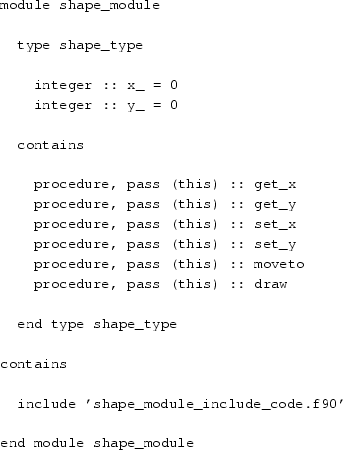



Introduction To Object Oriented Programming Springerlink




Fortran Wikipedia



Www Nics Tennessee Edu Files Pdf Hpcss13 14 01 21 Intro To Fortran Pt2 Pdf



Cds Cern Ch Record Files Toc Pdf



Aha Fortran Modelling Tools Manual




Fortran Wikipedia



Www Archer Ac Uk Training Course Material 18 02 Oofortran Daresbury Lectures L05 Classesandvisibility Pdf
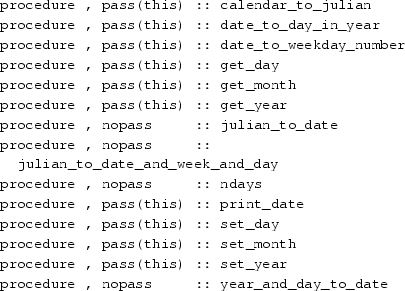



Additional Object Oriented Examples Springerlink




Pdf Design Patterns And Fortran 03



Www Csc Fi Documents 0270 Fortran9503 Handout Pdf Cf17db59 3267 48e7 9ccd 6e29df90cbb5



Http Www Elch Chem Msu Ru Tch Group Fortranbooks Fortran Object Oriented Pdf



Www Ugent Be Hpc En Training 18 Modern Fortran Materials Modernfortran18 Pdf



Events Prace Ri Eu Event 694 Material Slides 0 Pdf




The Fortran 90 Programming Language Book Chapter Iopscience




Fortran Wikipedia




Pdf Emulating Multiple Inheritance In Fortran 03 08
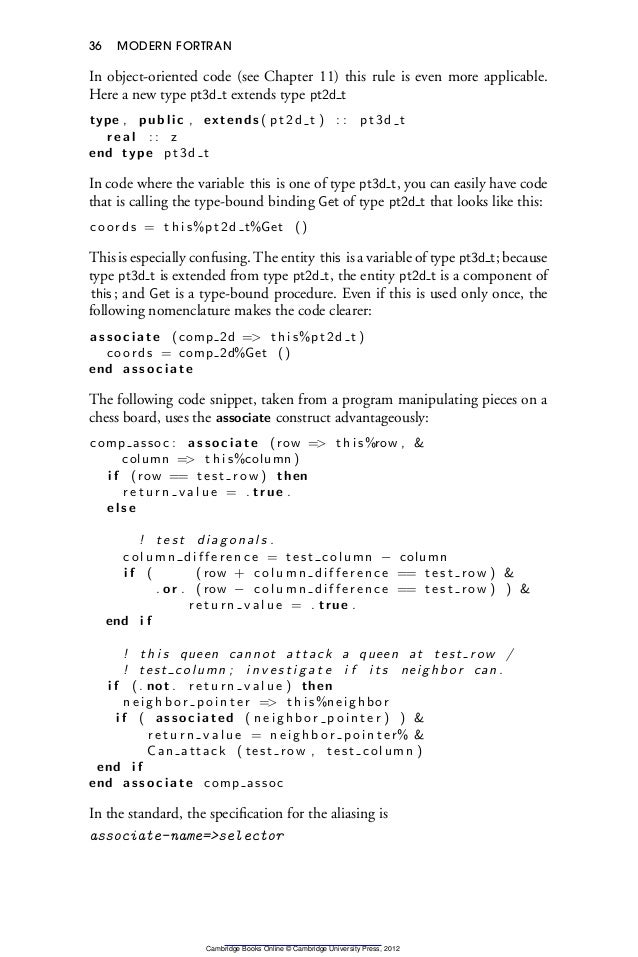



Uni Cambridge



Lahey Gnu Fortran Lassen Edition Windows 32 64 Bit



Wiki Uiowa Edu Download Attachments Fortran Novella Holcomb Pdf



Www Pgroup Com Doc Pgifortref Pdf



Www N Oca Eu Pichon Fortran00 Pdf
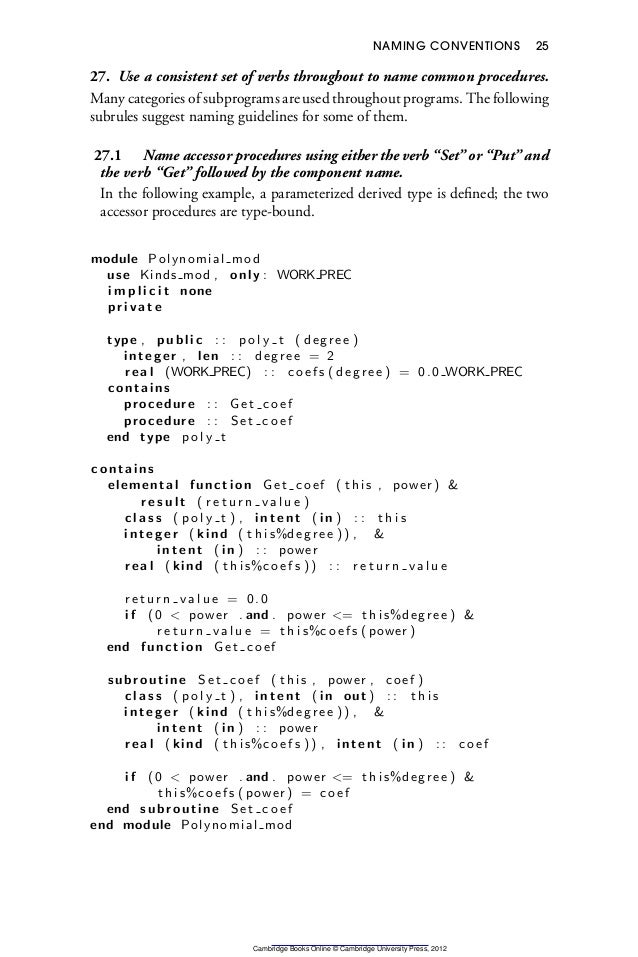



Uni Cambridge




8 Working With Abstract Data Using Derived Types Modern Fortran Building Efficient Parallel Applications




Automated Fortran C Bindings For Large Scale Scientific Applications



Ntrs Nasa Gov Api Citations Downloads Pdf




Pdf Object Oriented Programming With Fortran 0x
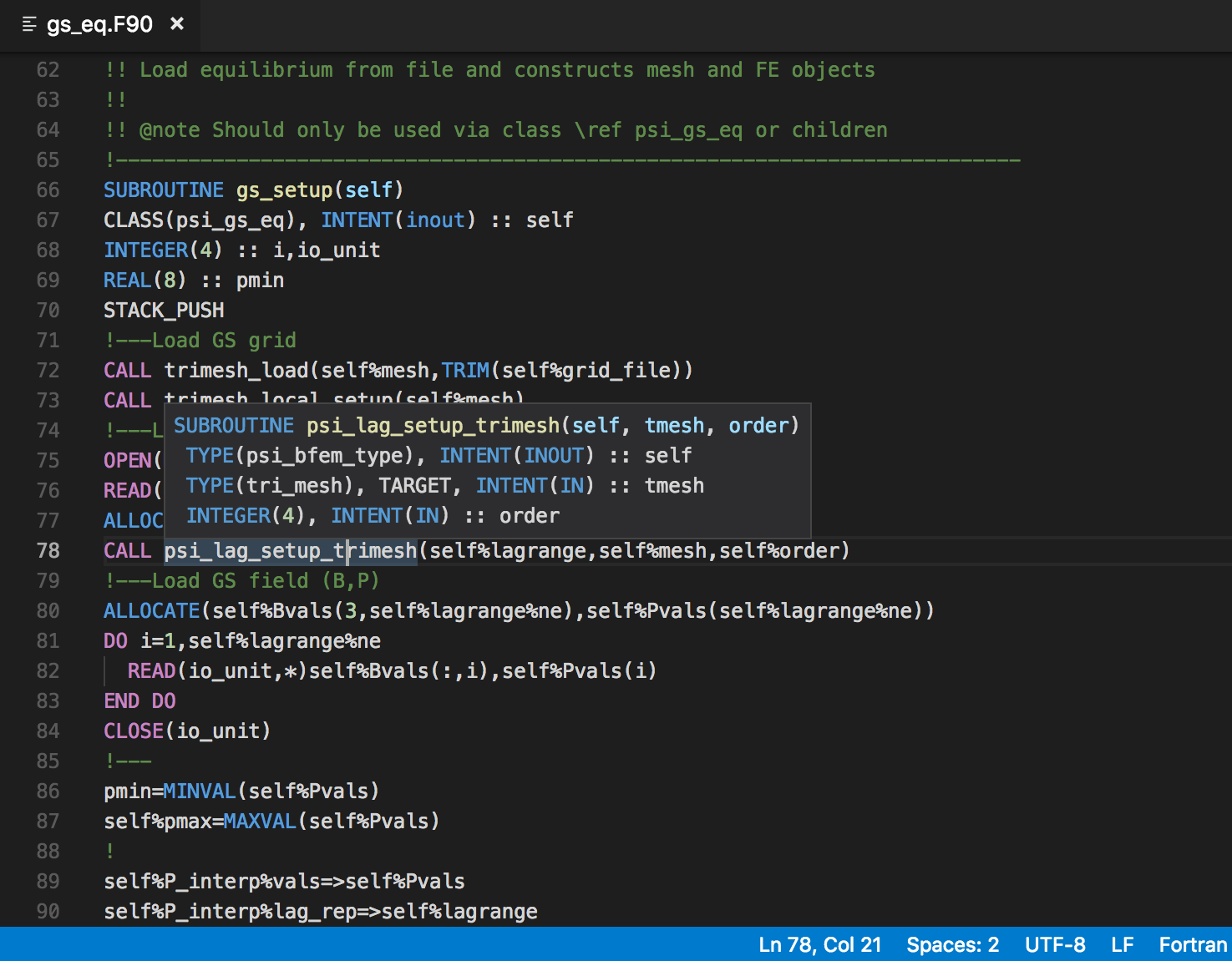



Fortran Intellisense Visual Studio Marketplace




Fortran 90 95 And Fortran 90 Generalities Format Changes Portable Numerics Arrays Syntax Classes Of Arrays Dynamic Storage Structures Ppt Download
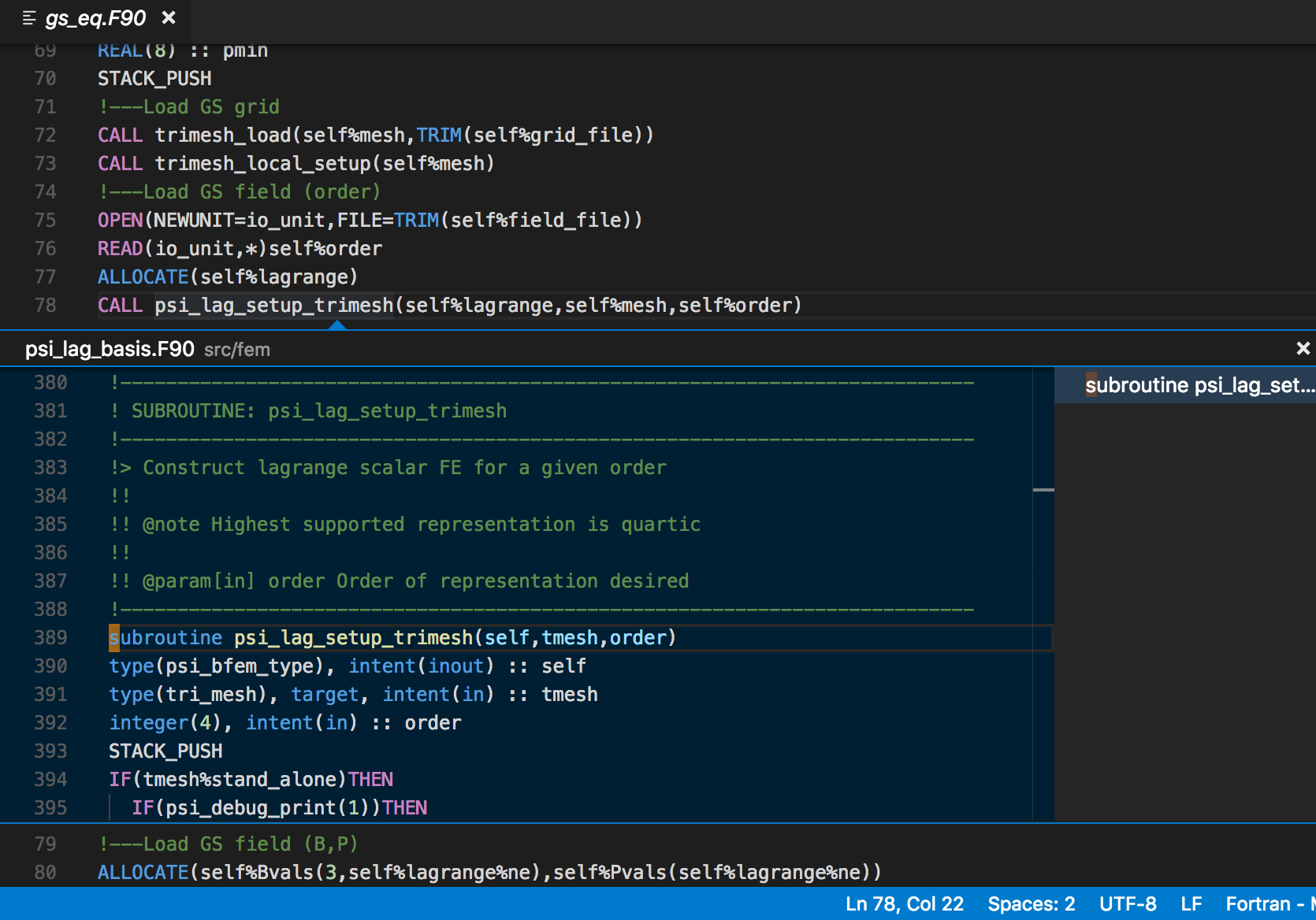



Fortran Intellisense Visual Studio Marketplace




Doctor Fortran In Not My Type Doctor Fortran



Http Www Fortran s Org 19 Fortranbenefitssurvey Final Pdf



Hpc Forge Cineca It Files Coursesdev Public 16 Bologna Introduction To Modern Fortran Cineca Introduction To Modern Fortran Bologna16 Pdf




Fortran 95 And Fortran 03 Tips And Techniques



1




Pdf Extracting Uml Class Diagrams From Object Oriented Fortran Foruml Semantic Scholar
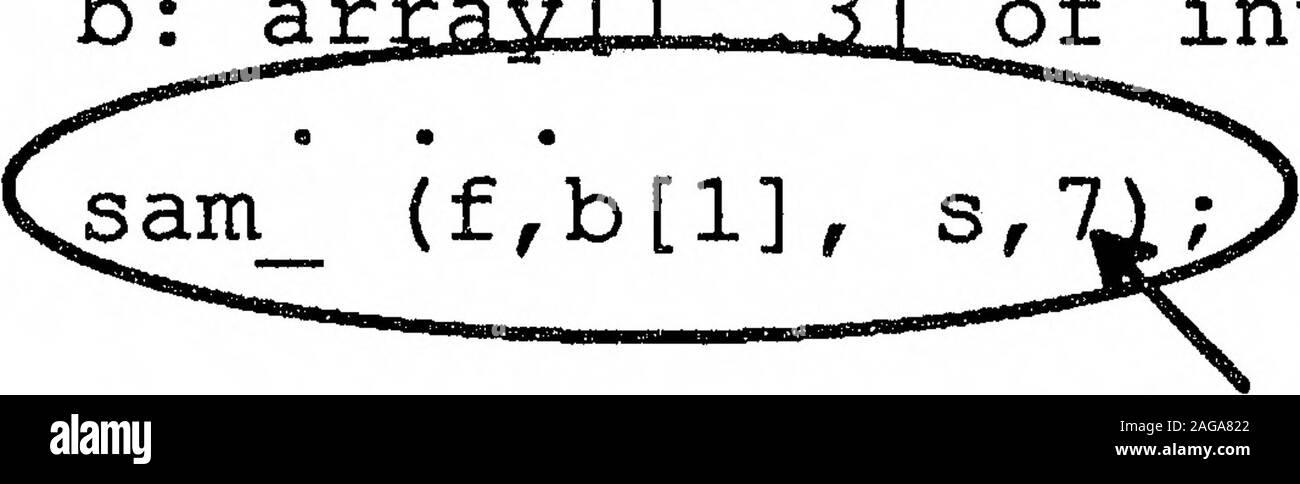



Mips Riscos 3103doc Mips Fortran Programmers Guide And Language Reference May19 Pascal Call To Sam Procedure F External S Array 1 7 Of Char B Arrayll 31 Of Integer Length Of Sis Explicit




Procedural Pointer In Fortran Stack Overflow
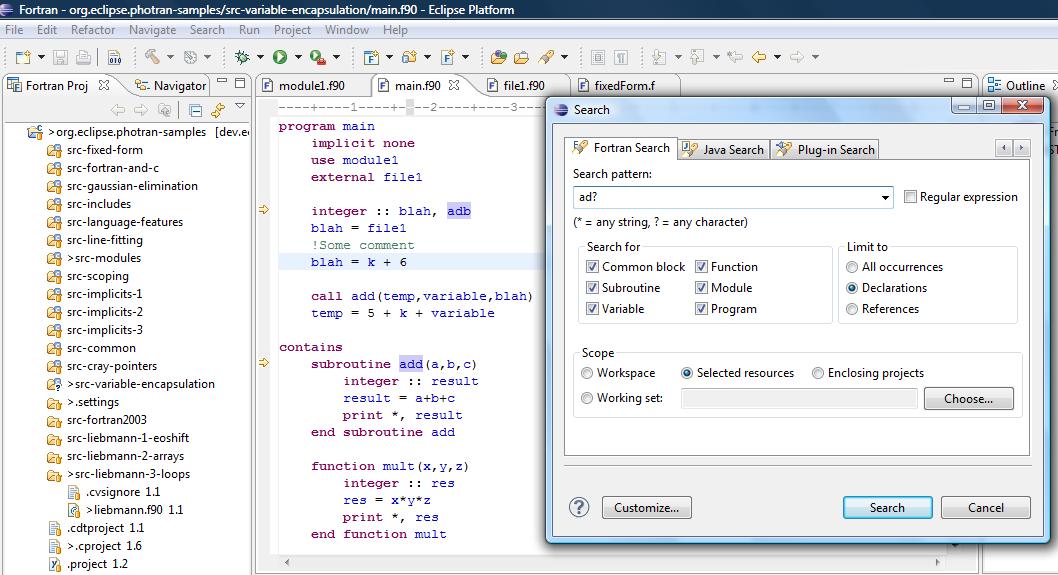



Ptp Photran Documentation Photran5advanced Eclipsepedia



Object Oriented Programming In Fortran 03 Part 1 Code Reusability Github



Www Archer Ac Uk Training Course Material 18 02 Oofortran Daresbury Lectures L05 Classesandvisibility Pdf



Http Www Astrosen Unam Mx Aceves Fisica Computacional Ebooks Handbook F03 Pdf




Github Hansec Ide Fortran Fortran Language Support For Atom Ide



Gcc Gnu Org Onlinedocs Gfc Internals Pdf



Www Archer Ac Uk Training Course Material 18 02 Oofortran Daresbury Lectures L05 Classesandvisibility Pdf



1




Emulating Multiple Inheritance In Fortran 03 08



Tcevents Chem Uzh Ch Event 3 Contributions 5 Attachments 15 68 Metaprogrammingwithfypp Pdf



Http Ahamodel Uib No Doc Hedtools Pdf



Cds Cern Ch Record Files Cn 95 001 Pdf




8 Working With Abstract Data Using Derived Types Modern Fortran Building Efficient Parallel Applications



1




Pdf Emulating Multiple Inheritance In Fortran 03 08



Wg5 Fortran Org N1851 N1900 N11 Pdf




Fortran Newsletter April 21 Fortran Programming Language



Q Tbn And9gcsbhb4gmauz61iqpgfsktmbrntimipma Fngmyqzunyx3ebvr 1 Usqp Cau



Lahey Gnu Fortran Lassen Edition Windows 32 64 Bit
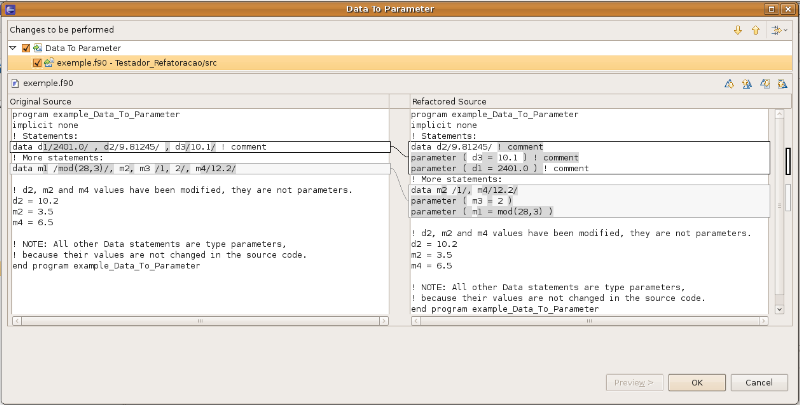



Ptp Photran Documentation Photran7advanced Eclipsepedia



Dl Acm Org Ft Gateway Cfm Id



Http Www Orengonline Com Arquivos Tutorial F90 Pdf
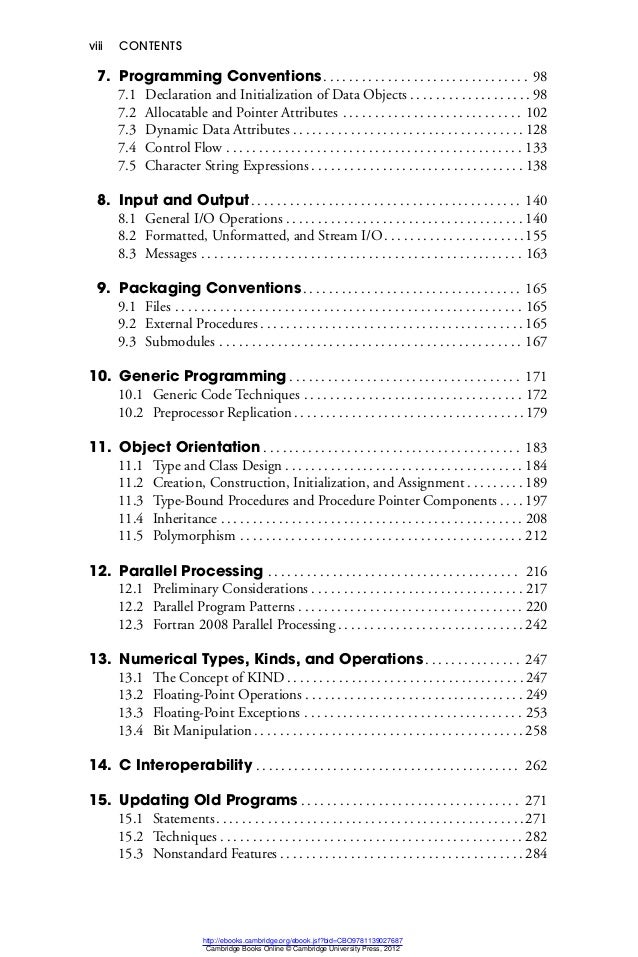



Uni Cambridge



Www Jstor Org Stable




Emulating Multiple Inheritance In Fortran 03 08



J3 Fortran Org Doc Year 21 21 007 Pdf



Http Fcode Cn Download Modern Fortran Style And Usage Pdf



Http Fcode Cn Download Modern Fortran Style And Usage Pdf



0 件のコメント:
コメントを投稿